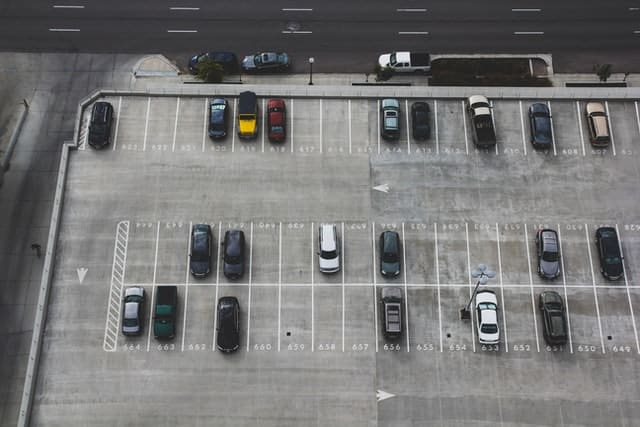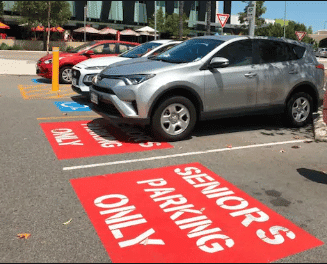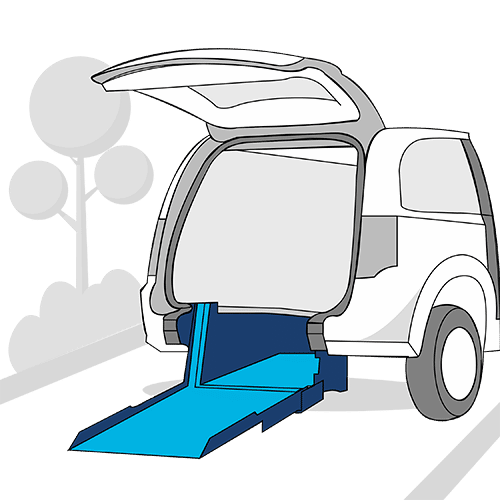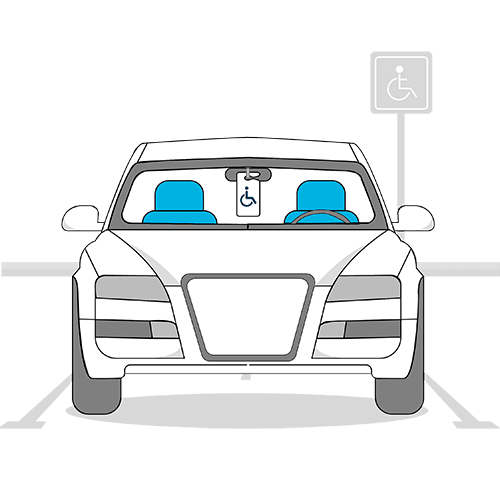It’s frustrating to arrive at a destination and find that all accessible parking spaces are taken. As someone living with disability or someone who’s earned the rank of ‘senior’, you may be wondering how certain benefits like seniors parking can make accessing places easier.
This begs the question – who can park in seniors parking and is someone with disabilities entitled to it too?
In this article, we explain the differences between parking spaces for disabled people and for senior citizens. Also, we explain how to determine whether you qualify to park in either space.
Who is a ‘senior’?
At the time of writing this, a senior citizen in Australia is someone at least 60 years of age and over. The exact age depends on your state or territory.
Seniors parking was created to provide easier access to high-traffic locations for these golden oldies. Why? Senior citizens are more likely to have age related mobility issues. Nearly half (44.5%) of all people with disabilities are aged 65 and older, according to The Australian Network on Disability.
So, is there a seniors parking permit that you can use, and when would you use it?

Who can park in seniors parking?
Who can park in seniors parking? Well, legally anyone.
There are different kinds of accessible parking bays in Australia. Those with a pram can use ‘parents with prams’ parking that allows closer proximity to the entrances of building for safety reasons. There are also accessible parking bays that can only be used by those with a disability parking permit.
However, unlike a disability parking permit spot – you do not need a permit to park in a seniors parking bay.
What are the seniors parking laws?
With seniors parking, there’s no law around who can and can’t use it. Though these bays are allocated for senior citizens, anyone can park in seniors parking without legal repercussions (including disability parking permit holders – good news).
With that said, it’s considered bad etiquette for people without mobility issues to park in a seniors or pram parking space when you’re not entitled to do so. Most people avoid it as a social taboo. Plus, car park operators can ask someone to move if they feel they’re not eligible to use this kind of parking.
You’ll usually find seniors parking at shopping centres, public spaces and high traffic areas, reserved by business owners as a courtesy to senior customers. They expect those who don’t need the parking space to leave them open for those who do. It’s fairly easy to spot seniors parking as they’re often marked in red to differentiate them from disability parking spaces.
These accessible parking spots are usually located closer to the entrance of buildings and leisure precincts, shortening the distance needed to walk.

Who can park in disability permit parking spaces?
Like seniors parking, the aim of disability permit parking spaces is to provide easier access to shops and other locations for people who have difficulty with their mobility.
If you have visible or invisible disabilities, you may be eligible for a disability parking permit. This permit will enable you to use an accessible parking space. The law protects these spaces, and only permit holders can use them. As a result, they’re more restricted than seniors parking.
Contrary to popular belief, these permits are not easy to get. Read about how to get a disability parking permit.
What about people with invisible disabilities?
Many people think only people who use wheelchairs or other disability equipment have disability parking permits. This is simply not true. Individuals with heart conditions, respiratory problems, balance issues and many other medical conditions have disability parking permits but don’t ‘look’ disabled.
A wide variety of disabilities can’t be seen just by looking at someone. Multiple sclerosis, Parkinson’s disease, cancer, arthritis, lung disease and fibromyalgia, among others, are examples.
Although invisible disabilities don’t always necessitate the use of mobility equipment, they do affect people’s ability to walk long distances without difficulty. It’s for this reason that many people with invisible disabilities qualify for disability parking permits.
You should be very aware of this before confronting or reporting someone who’s taken up an accessible or seniors parking space.
Read more about disability parking spots in our article: Why accessible parking spaces are designed the way they are.

Insurance for your needs
If you’re a senior citizen, you may be driving a WAV or using disability converted driving controls. Blue Badge Insurance – the first mobility insurance specialist in Australia – provides disability car insurance with discounted premiums of up 25%. We also offer affordable insurance for wheelchair accessible vehicles and converted cars.
This insurance also covers family, friends, carers and support workers while they’re driving the car with the DPP holder in it.
Mobility is freedom. Protect yours with Blue Badge Insurance. Click below to get a quick quote.








